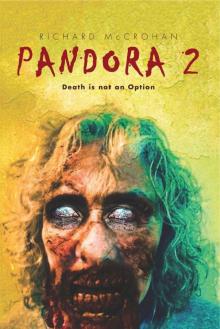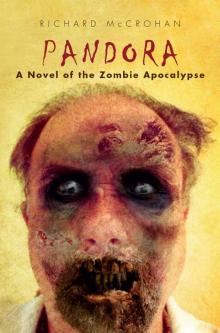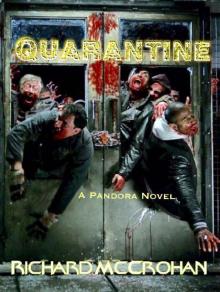- Home
- McCrohan, Richard
Pandora: A Novel of the Zombie Apocalypse Page 3
Pandora: A Novel of the Zombie Apocalypse Read online
Page 3
Jack started again and eventually pulled into their driveway. He shut off the ignition, and with the car knocking a couple of times, they sat in complete silence. No one could quite believe the sequence of events that had just occurred.
3
Sean, Jack, and Mike were about to mount their front steps when Mike abruptly turned and headed across the lawn to the house on their right.
“I’m going to check on Edith,” he said. He looked over his shoulder and, seeing the two of them standing there, looking concerned, slowed and said, “I’m just checking, is all.” He paused. “I just can’t go into our house right now. Not after all of this.” He turned back and continued to their neighbor’s house, while Sean and Jack reluctantly started up the stairs.
Edith Schoenbart had lived in the neighborhood for fifty years. She was eighty-one years old, spry, and quick-witted. When the boys first had moved in, she sort of had adopted them, inviting them over for home-cooked meals (she was a super cook) and baking them cookies. They, in turn, looked after her, shoveling her walk and driveway when it snowed, picking up groceries and medicines when she felt under the weather. All in all, she loved doting on them, and they adored her.
Mike climbed her stairs and walked to her door. A pretty spring wreath hung on the front of it, and just looking at this symbol of normalcy made him smile. He rang her bell. After a minute the door opened, and Mrs. Schoenbart peered out. Seeing Mike standing there, she immediately broke into a smile. After opening the door farther, she pushed open the screen door and looked up at her neighbor.
“Well, hello, Michael,” she said brightly. “It’s so nice to see you.”
“You too, Edith. Just checking in.”
“Well, thank you, young man. I’m just dandy. My niece Emily is here. She’s staying over for a few days.”
Mike remembered Edith’s niece from the last time she was there. Emily Frost lived on the other side of town. She was about forty-eight, overweight, and dowdy, with stringy hair always pulled back with a rubber band. Michael felt sorry for her. While she seemed nice, though a little slow, it was obvious she was forever destined to be alone.
“Emily wasn’t feeling very well, so I offered to let her come here and rest for a few days. You know,” Edith whispered conspiratorially, “ever since she came down with that Pandora virus, she’s never been quite right. She said she started feeling funny again, so I told her, ‘Emily, you come right over here now, and I’ll take care of everything. You need someone.’ I was just going upstairs to bring her some nice, hot soup. Nothing makes you feel better than a good bowl of soup.” She smiled and nodded as if hers were the words of Solomon.
Mike felt sicker and sicker as she spoke. “Edith…maybe I should call an ambulance for your niece. This may be serious. I think that—”
“Oh, pshaw!” Edith laughed with a wave of her hand. “Emily will be just fine. She came down with a bug—that’s all. I’ll take good care of her.” She started to close the screen door. “Now you run along, and don’t you worry. We’ll be just fine.” With that, she closed the screen then started to close the front door.
“Wait, Edith,” said Michael anxiously. “Maybe you should call the authorities like they’re saying on TV.”
“I’ll do no such thing, Michael Quinn,” Edith said, taken slightly aback by his insistence. She smiled again then glanced over her shoulder into the interior of her home. “Oh, I hear Emily calling me from upstairs now.” Still smiling she turned back to Michael and said, “I have to go. I have a patient to take care of, you know.” She gave Michael a pleasant smile and a little wave then closed the front door with finality.
“But…” started Mike belatedly, as he stood staring at the closed door. He reached up to knock but quickly brought his hand down. A waste of time, he thought. As he turned and walked back down Edith’s front steps, he decided to take matters into his own hands. He figured she would thank him later if what he was worried about turned out to be true. As he strode along the lawn back to his house, he took his cell phone from his pocket and punched in 911. Putting the phone to his ear, he waited. After a few rings, there came three electronic tones and a female voice saying, “The number you have reached is busy. Please hang up and call back later.” Michael took the phone away from his ear and stared at it incredulously.
“What the hell?” he said aloud. “How can 911 be busy?”
He tried again with the same result. Oh, fuck this, he thought. Shoving the phone back into his pocket, he continued to his house. As he placed a foot on the first step, he stopped and turned around. This quaint, quiet neighborhood he loved suddenly seemed menacing. As a cloud passed in front of the sun, the vista ominously darkened. Mike shivered; the widening shadows seemed to now hold evil, skulking things with sharp claws and needlelike fangs, ready to pounce and feed with wanton abandon. His once-beloved home was now a tortured Hieronymus Bosch painting.
He turned and hurriedly bounded up the steps, striding through the door, not looking back lest he see something skittering up the stairs after him.
Sean and Jack were sitting in front of the television when Mike walked in. They glanced at him as he walked over to them, then immediately went back to staring at the screen.
“Everything okay?” asked Sean.
“Uh, yeah,” said Mike, plopping down on the sofa next to him. “Emily is there. She, uh…she’s sick, and Edith is taking care of her.”
“Huh,” said Sean absently. He was too engrossed in the broadcast to pay attention to what his friend was actually saying.
As the three men sat there, staring at the screen, they felt they were watching a horror movie, not a news program. The pictures kept changing on the screen, showing images from all over the world. There were videos of riots in the streets, with police in riot gear with shields, beating civilians who sometimes acted crazed. And there were even clips of the military mobilizing and actually firing at individuals from behind tanks or barricades. They saw shots of dead bodies either sprawled limply in vacant streets or surrounded by several kneeling people who, seemingly, were pulling at the bloody corpses and stuffing pieces of them into their snarling mouths. The three young men kept flipping channels, all of which showed the same types of scenes.
On one of the cable news channels, a reporter from Paris showed a video clip of a dead man lying on his back on a wooden table, with his neck savaged and bite marks down his arms. For about thirty seconds, the man just lay there, the camera sometimes moving slightly as if being jostled or shifting position. Then, unnervingly, the man’s left arm twitched. It twitched again. And so did the right arm. His fingers slowly curled and uncurled. Then his head moved as if he were stretching a kink in his neck. As he groaned loudly, his eyes popped open. The camera crew moved back a little as the background noise of babbling voices increased. The dead man turned his head toward the camera. For a second he just looked at it. Then, as if realizing people were standing by, he tightened his face into a snarl and, with difficulty at first, sat up. Sitting on the edge of the table, his eyes milky white and pink drool forming at the ends of his lips, he growled at the camera. He suddenly put his feet on the floor and stood up. The picture wobbled, and the camera turned toward the floor. As the screen turned black, a shot sounded. The filming apparently stopped, and the view went back to the news anchor, who was visibly shaken.
Pausing and looking at the camera with frightened eyes, he said, “This news footage from our correspondent Glenn Burridge in Paris is reported to have been taken after the victim was attacked and killed. He was pronounced dead by a physician among Glenn’s group and was then taken to a nearby building, where he was placed, as you just saw. The footage was shot about fifteen minutes after the man was attacked.” He paused again, looked up from the teleprompter he was reading from, and continued. “He was dead. He was dead then reanimated: getting up and walking. This has been happening to all previous survivors of the Pandora virus. All of these individuals seem to relapse a few weeks after they
appear to have recovered. Officials at the Centers for Disease Control and the World Health Organization are calling this new mutation of the original virus the Pandora 2 Mutation. They also have said that anyone who is bitten by these people then dies as a result of the wounds also will be infected with the same virus. This phenomenon is happening worldwide.”
Sean pointed the remote at the screen and clicked the television off. “No,” he said, shaking his head. “Do you know what they’re saying?”
Jack grabbed the remote. “Wait. Turn that back on again.”
He must have inadvertently clicked on a different channel because a picture appeared with two men sitting opposite each other. Both individuals—one a slight, bespectacled man on the left and the other a stocky, completely bald man on the right—looked angry. The thinner one was speaking now, chopping his hand in the air as he made his point.
“Look, Dr. De la Rosa, this is a self-perpetuating viral apocalypse. You know it, and I know it.”
“I know no such thing!” insisted the stocky doctor. “We have procedures in place to—”
“Oh, come on!” interrupted the other man, moving to the edge of his seat and raising his voice further. “This is a debacle. How can you say this virus can be contained when you won’t even admit what we’re dealing with here?”
Dr. De la Rosa sighed loudly, putting his hand up and turning his head. “Oh, no, Mr. Knox,” he said disgustedly. “We will not get into that discussion again.” He spat out the word Mister as if it were an insult.
Leaning back as if slapped, Vernon Knox, author of the best-selling novel The Coming Plagues, turned bright red from anger. “No, you won’t,” he shouted, “because you’re too stupid to realize what we have here! You can’t even say the word. Zombies! They’re zombies, and if we can’t figure out that obvious fact now, we’re going to become zombies too.”
“I’m a doctor,” sneered the self-righteous man, “and you’re just a hack writer of fear-mongering science fiction.”
At that, Jack turned off the television again. The three of them sat there, looking at one another in stunned silence.
“Fucking zombies?” Sean asked. “These are zombies? No fucking way.”
They sat there together, alternately muttering words like zombie and shit to themselves, when Mike paused and said, “Does this mean Brian is a zombie too?”
The others turned and peered at him, aghast, the reality of the moment suddenly hitting them all in a very personal manner. Sean stood up from the sofa and, appearing a bit lost for a second, walked over to the table near the window and next to the wide-screen TV. He reached for his cell phone and said, “I’d better call my parents. I have to see if they’re okay.”
Sean’s parents lived very near in another town. He picked up his cell and said, “Excuse me,” then headed into the kitchen.
Mike glanced at Jack. He knew Jack had lost his mother when he was in high school and his father during the start of the Pandora virus. His father, whom he couldn’t stand (because he was, according to Jack, the world’s biggest asshole), had a bad heart, probably from screaming at everyone. The virus hit him hard, too hard for his weakened heart to cope with. His younger brother, Tommy, had joined the army to get away from him and didn’t even come to the funeral, saying he was in the middle of a mission in Afghanistan. Jack went and stayed only two days before coming home, saying he would deal with the estate from home.
“I’m sorry, Jack, but I should see if I can get a hold of my parents also. They’re on this Caribbean cruise they always go on this time of year, and I don’t know if I’ll be able to get in touch with them,” Mike said, realizing he was rambling.
Jack smiled and waved his hand in a shooing gesture. “I’m fine,” he said. “Go do what you have to do.”
Smiling back, Mike took his phone from his pocket and walked into the seldom-used dining room.
Sean, having just dialed his parents’ number, heard the television go on again but at a much lower volume. He took a bottle of springwater from the refrigerator then pulled out a kitchen chair and sat down. After four rings, his father, John, answered.
“Hello?”
“Hi, Dad,” Sean said. “Is everything okay there?”
“Ah, hello, son,” his father said, voice immediately lightening. “Everything’s fine here. You?”
Relieved, Sean blew out a gust of air.
“Wait a minute, son.” John Sullivan’s voice suddenly sounded distant as he called out, “Cessy!” That was his nickname for Cecelia, his wife. “Cessy, can you turn the TV down? I can hardly hear Sean.” A few moments later, he said, “Okay, Sean. Now I can hear what’s being said. Have you been following the news about Pandora? They say it’s a mutation of the original one.”
“Yeah, I know, Dad,” Sean said. “We’ve been following it on TV all day.”
“This sure is something. This went from bad to worse. Now all the poor people who caught the first Pandora are coming down with this second version. They’re getting sick and turning into raving lunatics.”
“I think they’re calling them zombies now,” Sean corrected.
“Bunk,” exclaimed his father with all the assurance of an elder. “Whoever’s been spouting that nonsense has seen one too many of those monster movies. Dead is dead. This Pandora mutation obviously has affected their brains. They pass out or something, then get up and go crazy, attacking people. Hey, wait. Didn’t Brian come down with the virus a few weeks ago?”
Sean grew pale and sweaty. In a soft voice, he said, “Yes, Dad, he did. He…he got sick again this morning, so we took him to Saint Mary’s ER. Dad…Brian is dead. He died in the ER.”
The phone was silent. When John finally spoke, he gasped. “Oh, my God! He’s dead? I can’t believe it. Not Brian. He was so fit.”
Sean sadly smiled; he knew Brian wasn’t really fit but just big. “I know. He got so sick so fast that it was hard to even grasp what was happening. We all just felt if a doctor saw him, he’d admit him, and then he’d be fine,” he told his father softly. “It was a nightmare.” Sean stopped there, not wanting to tell his dad the rest and upset him even more.
“Cessy is going to be so crushed to hear this,” John said sadly.
“Listen, Dad,” Sean said, concerned, “you have to be very careful now. Things are falling apart fast already. I’m hoping for the police or the National Guard to get it together and do something to control this. If they quarantine the other infected people quickly, maybe this can be contained.”
“Don’t worry, son,” John Sullivan said confidently. “Your mother and I aren’t going to do anything stupid. I’m sure the cavalry is coming to the rescue. They’ll be knocking on our door to take us to safety in no time. Say, listen, I have to get off the phone now. It’s time for me to feed Zoey and take her for a walk. She doesn’t move so quickly now. I think the arthritis is getting to her. You take care, son. I’ll see you soon.”
“Bye, Dad,” Sean said longingly, “and tell Mom I love her.”
With that good-bye hanging in the air, they both hung up. Sean walked back into the living room. Mike was already there. He saw Sean and answered his unspoken inquiry. “Had a hard time getting through,” Mike said. “All static and such. I’ll try again later.”
Mike had a sister, Erin, too. She was several years older and a real wild child. Always in trouble for something, Erin cared only about Erin. She said she hated her parents and barely tolerated her brother. Growing up, Mike had tried everything to break through her emotional wall. He couldn’t stand the fact that she wanted nothing to do with him or her family. Finally, at eighteen, she had picked up and moved to New Orleans. She thought it was a party city, and she was all about the party. Since then the family had heard from her only twice. As far as Mike was concerned, Erin had thrown her family into the garbage, and he couldn’t wrap his head around why. He didn’t even know her phone number.
Taking two steps closer, Sean looked at the television screen. “I don’
t know about anyone else, but I really need a drink.”
Jack looked at his watch. “Well, it’s five o’clock somewhere. I’m with you.”
“I’ll drive,” said Mike, jumping for his keys. The three grabbed their phones and headed out the door.
Paddy Flannigan’s was one of several local taverns. A little nicer than some, it catered to the twenty- and thirtysomething crowd. There were televisions all over the room, cool eclectic items mounted on the walls, a great selection of microbrews on tap, and really tasty food.
On the way there, the three friends noticed a lot of people hauling their belongings to their cars, the men hurriedly loading bags and their wives and children standing to the side, looking scared. After Sean, Mike, and Jack arrived at the tavern and pulled into the nearly empty parking lot, they exited the car.
“Wow!” exclaimed Sean. “The lot is practically empty. It’s always packed on Saturday afternoons. Everyone always watches the games here.”
With that thought hanging in the air, the three entered Tommy Flannigan’s.
4
Edith Schoenbart sat in her comfy easy chair, reading a book. She had stopped watching television hours ago when the news had gotten too scary and depressing. She much preferred a good book anyway and was even thinking of imbibing a little glass of sherry, her one indulgence.
She had looked in on Emily earlier, and the poor dear seemed to be asleep. Edith really didn’t like the way she was looking and was growing very concerned. Though now that she had fallen asleep, Edith thought maybe she should just let her rest then decide what to do in the morning. Having made up her mind, she smiled. Well, she thought, it is five thirty, time for me to get a little something to eat. She walked into the kitchen, took some tuna salad out of the fridge, and put it on the table. Then she grabbed a knife and a loaf of bread and started to prepare a sandwich. There came a soft knock and some shuffling from the upstairs bedroom. Edith looked up and waited. No more sounds came from above, so she went back to making her light dinner. Hearing a noise again, she turned and let out a gasp. There was Emily, standing at the entranceway to the kitchen. Her face was deathly pale, almost gray, with a trace of red saliva on her lips. Though still bloodshot, her eyes were milky white. She swayed slightly and took a step into the room.

 Pandora (Book 5): Behold A Pale Horse
Pandora (Book 5): Behold A Pale Horse Pandora 2: Death is not an Option
Pandora 2: Death is not an Option Pandora: A Novel of the Zombie Apocalypse
Pandora: A Novel of the Zombie Apocalypse Quarantine: A Pandora Novel
Quarantine: A Pandora Novel